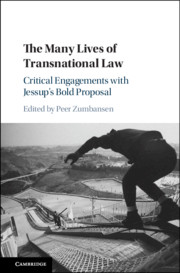Book contents
- Reviews
- The Many Lives of Transnational Law
- The Many Lives of Transnational Law
- Copyright page
- Contents
- Contributors
- Preface and Acknowledgements
- Introduction Transnational Law, with and beyond Jessup
- Part I Transnational Law
- Part II Transnational Law as Regulatory Governance
- 4 Aiding and Abetting in Theorizing the Increasing Softification of the International Normative Order: A Darker Legacy of Jessup’s Transnational Law?
- 5 From International Law to Jessup’s Transnational Law, from Transnational Law to Transnational Legal Orders
- 6 Transnational Law in the Pacific Century
- 7 Transnational Law in Context
- 8 Transnational Law and Adjudication: Domestic, International and Foreign Intersections
- 9 Transnational Law and Global Dispute Resolution
- 10 Conflicts of Law and the Challenge of Transnational Data Flows
- 11 What Lex Sportiva Tells You about Transnational Law
- 12 Family Law
- Part III Transnational Law
- Part IV Conclusion
- Index of Names
- Subject Index
10 - Conflicts of Law and the Challenge of Transnational Data Flows
from Part II - Transnational Law as Regulatory Governance
Published online by Cambridge University Press: 18 March 2020
- Reviews
- The Many Lives of Transnational Law
- The Many Lives of Transnational Law
- Copyright page
- Contents
- Contributors
- Preface and Acknowledgements
- Introduction Transnational Law, with and beyond Jessup
- Part I Transnational Law
- Part II Transnational Law as Regulatory Governance
- 4 Aiding and Abetting in Theorizing the Increasing Softification of the International Normative Order: A Darker Legacy of Jessup’s Transnational Law?
- 5 From International Law to Jessup’s Transnational Law, from Transnational Law to Transnational Legal Orders
- 6 Transnational Law in the Pacific Century
- 7 Transnational Law in Context
- 8 Transnational Law and Adjudication: Domestic, International and Foreign Intersections
- 9 Transnational Law and Global Dispute Resolution
- 10 Conflicts of Law and the Challenge of Transnational Data Flows
- 11 What Lex Sportiva Tells You about Transnational Law
- 12 Family Law
- Part III Transnational Law
- Part IV Conclusion
- Index of Names
- Subject Index
Summary
Philip Jessup correctly observed sixty years ago that multinational corporate activity created new challenges for nation-states and their territorially based rules for jurisdiction, choice of law, and judgment recognitions. Those challenges are exponentially more difficult in the 21st century because electronic data—everything from e-mails and text messages to Facebook and Instagram posts to Twitter pronouncements to drone warfare data to search algorithms to financial transactions to cloud data storage—travel around the globe with little relationship to physical territory. In addition, all of this data is often in the custody and control of data intermediaries. Three important consequences flow from this ubiquitous technology-enabled, data-driven global societal activity. First, the territorial location of data becomes increasingly arbitrary and substantively unimportant. Second, territorially based courts (or law enforcement authorities generally) will often be unable to easily enforce their decisions because those decisions require cooperation from relevant actors in far-flung communities. Third, governmental and judicial authorities are increasingly turning to multinational corporate data intermediaries to carry out and enforce their orders because only those companies have sufficient global reach to make legal rulings effective.
Keywords
- Type
- Chapter
- Information
- The Many Lives of Transnational LawCritical Engagements with Jessup's Bold Proposal, pp. 240 - 268Publisher: Cambridge University PressPrint publication year: 2020



